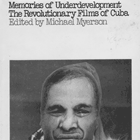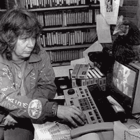Quotes on Documentary
(Many of these quotes were originally posted at "Reel Life Stories: Documentary Film and Video Collections in the UC Berkeley Library's Media Resources Center.")
- "We think of film as a bullet that ignites consciousness We must serve as the stone that breaks silence, or the bullet that starts the battle. Poetry is not a goal in itself. Among us poetry is a tool to transform the world."
- —Raymundo Gleyzer (though also attributed to Ernesto Ardito, co-director of the wonderful documentary Raymundo)
- "Filmmakers who work towards a revolutionary cinema in South America must not limit themselves to denouncing, or to the appeal for reflection; it must be a summons for action. It must appeal to our people's capacity for tears and anger, enthusiasm and faith..."
- —Raymundo Gleyzer
- In feature films the director is God; in documentary films God is the director.
- —Alfred Hitchcock
- Reality changes; in order to represent it, modes of representation must change.
- —Bertolt Brecht
- We realized that the important thing was not the film itself but that which the film provoked.
- —Fernando Solanas ("Cinema as Gun")
- Above all, documentary must reflect the problems and realities of the present. It cannot regret the past; it is dangerous to prophesy the future. It can, and does, draw on the past in its use of existing heritages but it only does so to give point to a modern argument. In no sense is documentary a historical reconstruction and attempts to make it so are destined to failure. Rather it is contemporary fact and event expressed in relation to human associations.
- —Paul Rotha (1935)
- We believe that the cinema's capacity for getting around, for observing and selecting from life itself can be exploited in a new and vital art form"
- —John Grierson, First Principles of Documentary
- We believe that the materials and the stories taken from the raw can be finer (more real in the philosophic sense) than the acted article.
- —John Grierson
- I think it's inevitable that people will come to find the documentary a more compelling and more important kind of film than fiction. Just as in literature, as the taste has moved from fiction to nonfiction, I think it's going to happen in film as well. In a way you're on a serendipitous journey, a journey which is much more akin to the life experience. When you see somebody on the screen in a documentary, you're really engaged with a person going through real life experiences. So for that period of time, as you watch the film, you are, in effect, in the shoes of another individual. What a privilege to have that experience.
- —Albert Maysles
- In documentary we deal with the actual, and in one sense with the real. But the really real, if I may use that phrase, is something deeper than that. The only reality which counts in the end is the interpretation which is profound
- —John Grierson
- I am eye. I am a mechanical eye. I, a machine, am showing you a world, the likes of which only I can see.
- —Dziga Vertov, Kinoglas
- My road is towards the creation of a fresh perception of the world. Thus I decipher in a new way the world unknown to you.
- —Dziga Vertov, Kinoks-Revolution
- It's all movies for me. And besides, when you say documentaries, in my case, in most of these cases, means "feature film" in disguise.
- —Werner Herzog
- I don't know what truth is. Truth is something unattainable. We can't think we're creating truth with a camera. But what we can do, is reveal something to viewers that allows them to discover their own truth.
- —Michel Brault
- Every cut is a lie. It's never that way. Those two shots were never next to each other in time that way. But you're telling a lie in order to tell the truth.
- —Wolf Koenig
- My obsession has been — and is still — the feeling of being there. Not of finding out this and analyzing this or performing some virtuous social act or something. Just what's it like to be there"
- —Richard Leacock
- We are really only successful in finding out anything when we are filming somebody who is more concerned with what he is doing that with the fact that we care filming him.
- —Richard Leacock
- Of course there's conscious manipulation! Everything about a movie is manipulation ... If you like it, it's an interpretation. If you don't like it, it's a lie — but everything about these movies is a distortion."
- —Frederick Wiseman
- I look on cinema as a pulpit, and use it as a propagandist.
- —John Grierson
- If you want to tell the untold stories, if you want to give voice to the voiceless, you've got to find a language. Which goes for film as well as prose, for documentary as well as autobiography. Use the wrong language, and you're dumb and blind.
- —Salman Rushdie
- The word documentary is problematic for me. Everybody thinks they know what they mean by it but I don't. It's a term that masks or clouds the realities of film experience, seeming to deny that fiction can tell useful sober truths and affirming that documentary can do nothing but. When I teach documentary, I use a substitute term, "films of edification," because I think the best way to describe this group of films is by their stance. All non-fiction films claim to edify. (Whether they do or not is another matter.)
- —Jill Godmilow
- All art is a kind of exploring ...To discover and reveal is the way every artist sets about his business.
- —Robert Flaherty
- Sometimes you have to lie to tell the truth.
- —Robert Flaherty
- To the documentary director the appearance of things and people is only superficial. It is the meaning behind the thing and the significance underlying the person that occupy his attention... Documentary approach to cinema differs from that of story-film not in its disregard for craftsman-ship, but in the purpose to which that craftsmanship is put. Documentary is a trade just as carpentry or pot-making. The pot-maker makes pots, and the documentarian documentaries.
- —Paul Rotha
- Give us adequate images. We lack adequate images. Our civilization does not have adequate images. And I think a civilization is doomed or is going to die out like dinosaurs if it doesn't develop an adequate language for adequate images.
- —Werner Herzog
- Our eyes see very little and very badly Š so people dreamed up the microscope to let them see invisible phenomena; they invented the telescope...now they have perfected the cinecamera to penetrate more deeply into he visible world, to explore and record visual phenomena so that what is happening now, which will have to be taken account of in the future, is not forgotten.
- —Provisional Instructions to Kino-Eye Groups, Dziga Vertov, 1926
- "My film aims at contributing to the urgent and indispensable discussion under way in my country, in Latin America, in the entire world, on the inhumanity of globalization. At the same time it aspires to prove that another world is possible."
- —Fernando Solanas
- You have to understand, my dears, that the shortest distance between truth and a human being is a story.
- —Anthony de Mello, from One Minute Wisdom
-
Randy: And where some generations may not be on the internet, they will read a paper, and see the film section, and read a review of the movie. Did you have certain goals when you started VBS.tv?
Moretti: The idea with VBS was to make something specific for the internet. When it came to news, we had a very particular goalŃwe want to cover big news stories but in a way that the mainstream press is missing. Even the way they conduct their shoots, they way they chase their story, their voice, everythingÕs got a protocol. You gotta talk up and down. This whole stupid thing that alienates so many people. Especially young people. Another fucking talking head standing in the poppy field of Afghanistan telling you that this is bad and dangerous and blah blah blah. It has no emotional impact. We wanted to do news that mattered to us. We wanted to be able to have an opinion and be able to learn along the way, not have to pretend to give you the definitive lowdown on where Bin Laden is, or whatever the case may be.
Alvi: We wanted to rip up that old rulebook.
Moretti: We didnÕt know it so it was easy. [laughs]
Alvi: WeÕve always believed that subjectivity is important with Vice. But with substantiation as well, so itÕs not just some guy ranting.
Moretti: We did want one thing to happen with VBS. We wanted to produce in such a way that things could go from small pieces to [bigger ones]. We were imagining TV, not really film. These stories could migrate to a traditional medium. This has just happened fast. Like holy shit, weÕve only been up five months and we have this feature film.
Randy: The term that came to mind for the Vice style of reporting is gonzo journalism. But is that a fair term at all?
Alvi: No. We werenÕt in a drug-fueled mission to Baghdad and partying in Sadr city with Iraqi prostitutes. When we started the Vice Guide to Travel the mission was 60 Minutes meets Vice, basically. Whatever label you can give that is what this is.
Randy: The king of the world in this vibe of news is 60 Minutes, but they still have a time limit with their medium. And as strong as they are, they still have sponsors paying for it. You guys have taken the level of story they do and made the form and distribution personal.
Moretti: A lot of our stuff is like that. Very first person. 60 Minutes is something we inspire to, a journalistic standard we admire. - —Razorwire interview with Suroosh Alvi and Eddy Moretti of VBS (and directors of Heavy Metal in Baghdad)
- I looked at all kinds of films, and I did every kind of research you can imagine, talking, reading books, watching other films and then most of all thinking. I was able really to think about what I felt, how to express it and I did a lot of worrying. On all the films I've made I have never celebrated after a day of shooting. I start worrying and after shooting, no matter how good it is, I always think 'well jeez, sorry we did that' but what didn't we get, what do we still have to get while we're here or in this situation or at this school or in this firehouse, wherever I happen to be filming.
Always worry, that's just advice to a filmmaker. I never feel reassured until the film is over, mixed and released. Reassurance is not something that I as a filmmaker have felt or as a writer, until the whole thing is over. - —Peter Davis
- "If the first casualty of war is truth, the last is memory."
- —Peter Davis
Back to Theory






